Which industries use AI as a core driver of Industrial Revolution 4.0? Big Data, sensors, gadgets, the Internet of Things (IoT), cloud facilities, Machine Learning, and AR/VR – all of them are based on Artificial Intelligence principles. So those who mastered it can master the rest and go beyond the competition. Here we’ll share the list of top domains that need AI as air and use its benefits and capabilities for business growth. Scroll down to explore the reasons and see why this technology is worth your investment in 2023.
Meet Artificial Intelligence: About the Technology in Plain
Since the 1950s, AI has remained a rather vague term. Thanks to Hollywood, it is associated in popular minds with many things – from Terminator, C-3PO, Sonny, and other robots to omnipotent cybernetworks like the Matrix.
“Artificial Intelligence” is applied to describe any human-like activity performed by a program or machine to accomplish some task. Some of them we credit with a certain independence of decision-making and action – like strategic computer games, autonomously operating cars, or military simulations.
However, whatever guise is assumed by these silent assistants, their ability to plan, learn, make conclusions, solve problems, move, perceive, and manipulate objects in real-time makes them indispensable in various domains.

Related: Machine Learning vs Artificial Intelligence vs Deep Learning
What Business Benefits Got Industries that Use AI
1. Elimination of Human Factor
We are social beings, so we prefer to deal with humans, not machines. However, being humans, your colleagues, partners, employees, and managers may fail in their promises or make mistakes.
Machines and systems powered by Artificial Intelligence reduce or eliminate the opposing sides of human participation. Properly programmed and acting according to a prescribed set of algorithms, AI can solve problems with a precision undreamed of for people.
2. Round-the-Clock Availability
People can’t work without pauses, which are necessary to refresh and recharge batteries for a new activity. AI doesn’t need any rest and can work 24/7, doing its job incessantly and tirelessly. Some processes require this ceaseless vigilance that humans can’t provide. It is vital for life support systems and continuous production cycles, where AI reigns supreme.
3. Reducing Manual Work
Work routine is still a leader among the reasons talents feel burnout and have poor employee experience. Meanwhile, AI can work productively no matter how often it repeats the same operation. So such mundane jobs as verifying bank documents, sending thank-you emails, and so on can be relegated to AI to handle.
4. Prompt Decision-Making
Humans tend to weigh many factors before opting for a course of action, which takes quite a time. AI does all that in a split second, which enhances productivity immensely. Moreover, Artificial Intelligence is free from doubt, exasperation, or doldrums. Emotions don’t interfere where strict algorithms are applied. Therefore, all decisions by AI will be not only fast in adoption but more correct as well.
5. Functioning in Hazardous Conditions
Robots powered by AI can work in places where humans don’t venture – in outer space, under water and ground, or in conditions of biocidal radiation. Such robots are also of great help in assignments fraught with risks for human health or life, like defusing a bomb or lifting heavy weights.
Realizing the numerous assets Artificial Intelligence brings, companies and individual entrepreneurs invest in AI-related projects for substantial sums, expecting them to have yielded about $100 billion by 2025. Today, the ushering of AI into their regular workflow beckons dozens of industries.
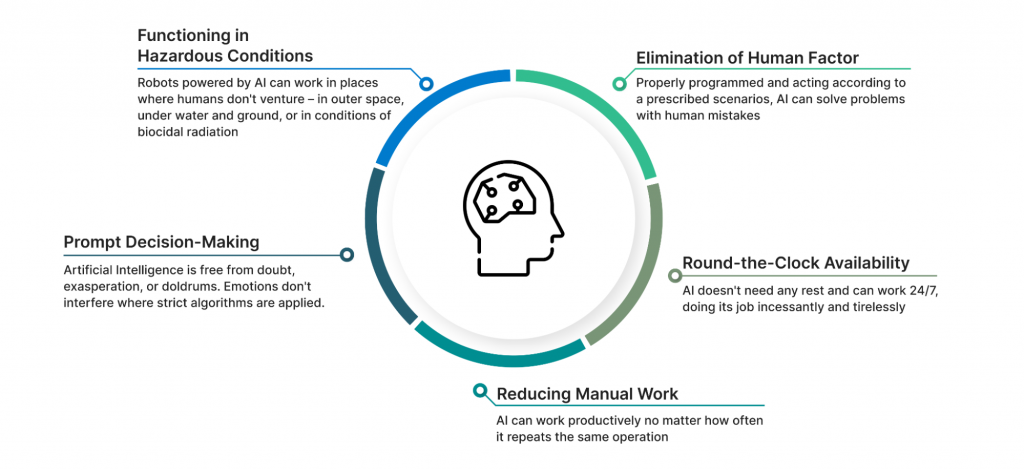
Related: Artificial Intelligence In Business: Its Impact and Future Prospects
What Industries Use Artificial Intelligence to Save a Competitive Advantage
1. Healthcare
When it comes to AI in healthcare, our imagination readily conjures an image of a robotic surgery arm performing high-precision operations, after which patients can leave the hospital within a few hours. Yes, AI also partakes in this process, but its scope of employment is far greater. Companies like Cambio Health Care, Coala, and Aifloo, develop innovative software that can track people’s physical and mental condition helping to spot the symptoms of cardiac diseases and strokes or keep a close eye on patients in nursing homes and hospices.
Artificial Intelligence is also instrumental in diagnosing illnesses – the application that has come to the fore in our COVID-ridden world of 2020. Special computer programs working via image recognition can inform people far from the doctor about their health problems and help the physician choose a treatment method. Moreover, some apps (like the one launched by Babylon Health) can act as a doctor, inquiring about a person’s symptoms and providing an instant free consultation on what should be done.
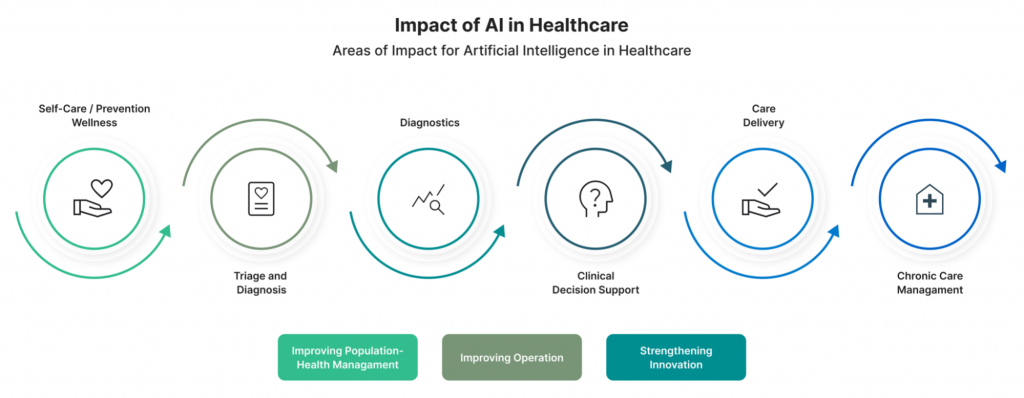
Related: Artificial Intelligence For Healthcare: 5 Trends To Watch
2. Education
The pandemic was a powerful fuel for e-learning. Developers started to create educational apps where AI can map a personalized and efficient path for every learner to acquire knowledge in different domains. The latter isn’t limited to classical math or science. The capabilities of AI, augmented and virtual reality technologies can be helpful even in physical education, to say nothing of history or languages.
While Artificial Intelligence is an excellent help in conventional classrooms, it is indispensable for teaching physically and mentally disadvantaged people. AI-fueled tactile robots do exceedingly well in such cases, helping students not only in certain subjects but with social interactions in general.
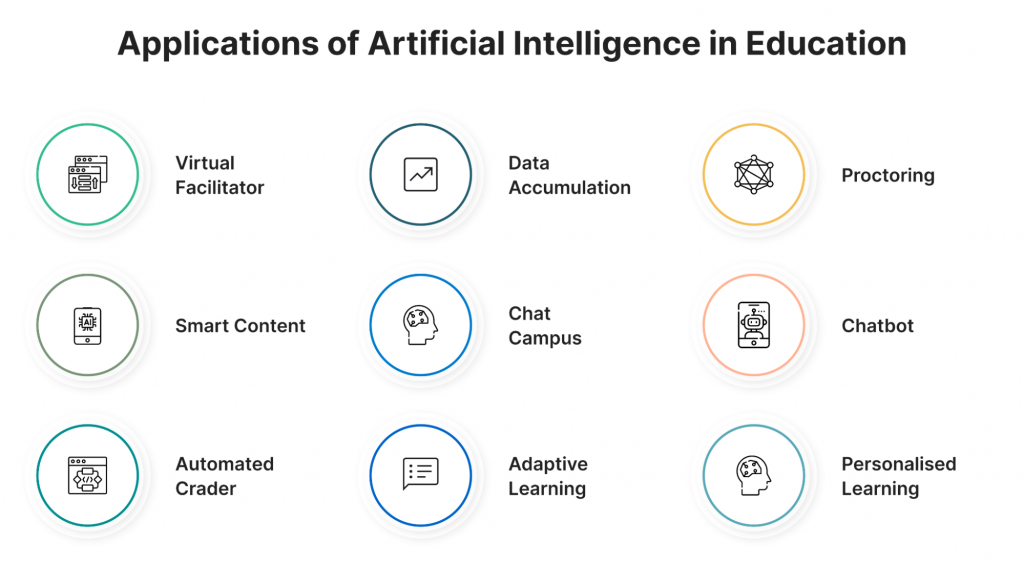
3. Marketing
This field is extremely susceptible to the introduction of AI, which can streamline numerous business processes. For example, Responsive Search Ads by Google help to calculate various marketing parameters, including conversion and click-through rates. Other tools are used to optimize:
- the ordering procedure
- customer support
- data analytics
- refund practices
- other elements of the sales workflow
Artificial Intelligence allows enterprise marketers to manage thousands of campaigns in real-time without developers’ participation. The technology tailor offers to each customer to make them client-oriented.
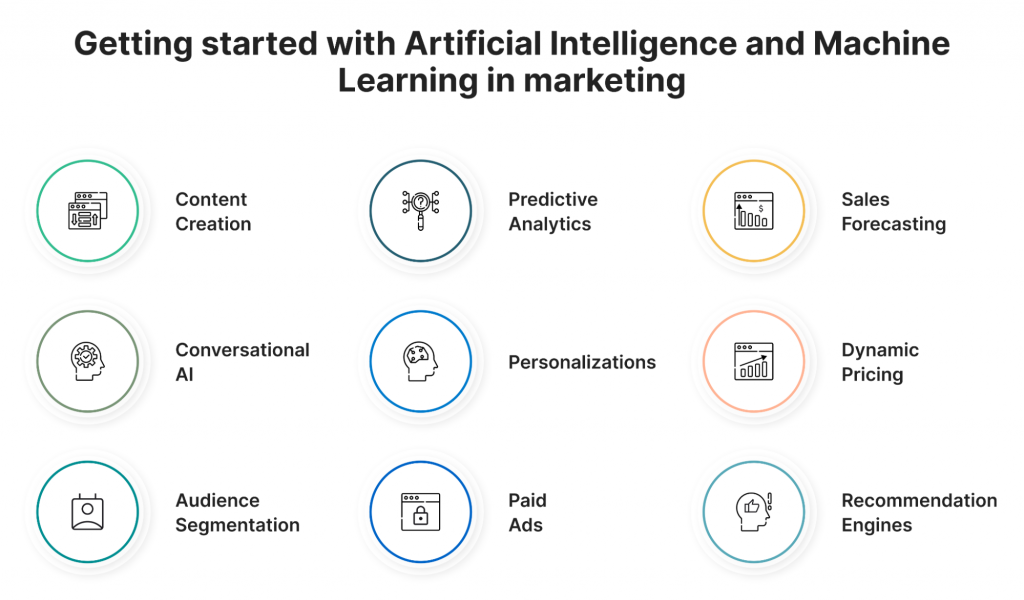
Related: Artificial Intelligence As the Main Tool to Make Marketing Campaigns More Effective
4. Banking & Finance
This sector is notorious for its vast amounts of paperwork and documentation. AI is leveraged to reduce them to a necessary minimum, transferring most of them into digital format. Software tools are also applied in banking and finance for data arrangement and subsequent analysis.
For instance, a chatbot by Kami sifts through chat conversations to determine each customer’s tastes and preferences. Thus, financial companies can provide more targeted consultation services and plan their future steps based on AI-obtained insights.
Related: Artificial Intelligence In Financial Services: 6 Improvements Of A Lifetime
5. Agriculture
Here the application of AI is incredibly challenging since it has to consider many hard-to-predict factors related to weather conditions. However, current achievements in this domain are astounding. DOT Technology Corp produced an automatic seeder that can sow a large area without human interference. Other companies feature similar innovative machines whose AI enables them to plant, fertilize, cultivate, and harvest crops and monitor soil moisture levels to determine the necessity of watering them.
Artificial Intelligence is leveraged to literally elevate agriculture to a new level by employing pre-programmed drones that can not only watch the fields form on high and detect possible problems but also spray weedicide or fungicide or even mechanically remove moisture from ripe cherries after a heavy rain to prevent them from bursting.
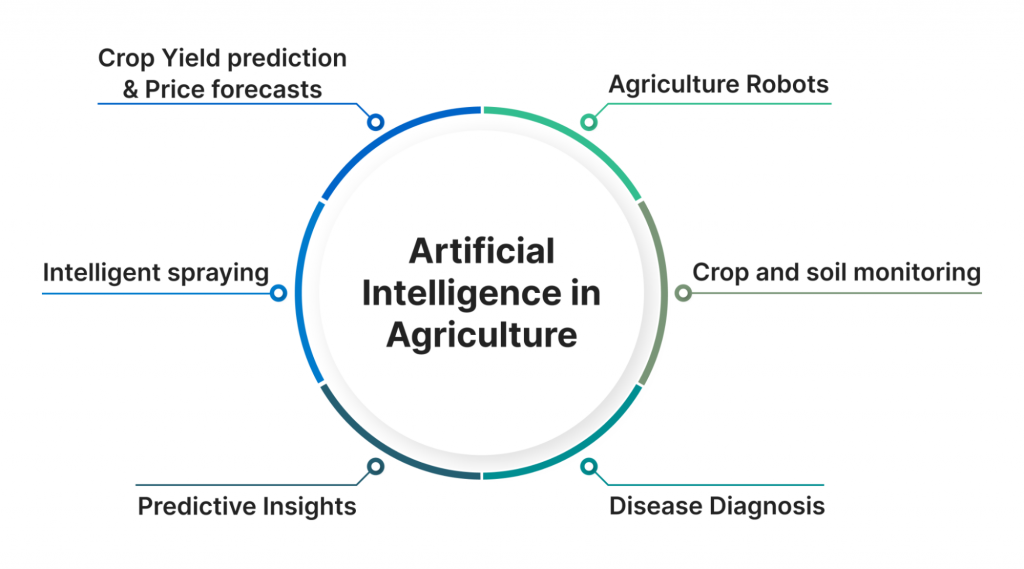
Related: Artificial Intelligence & IoT in Agriculture: 6 Smart Ways to Improve the Industry and Gain Profit
6. Transportation
The world is abuzz talking about self-driving cars, and the first pioneer models have already been tested. Some companies (like Waymo) have even introduced a public ride-hailing service employing autonomous vehicles. AI in them collects all data from the radar, GPS, cameras, and cloud facilities, which are analyzed to give orders to the control system setting the vehicle into motion and navigating it in the traffic.
(in billion U.S. dollars)
Related: How Machine Learning Can Enhance the Supply Chain
7. Gaming
The contemporary entertainment industry relies heavily on AI, and gaming is no exception. A modern computer or mobile game is workmanlike software that provides total immersion and creates complex simulations. Moreover, such games stopped being considered an amusement and are widely applied for more serious purposes. For instance, Arctic Shores produces custom games leveraged by blue-chip organizations like Xerox and Citi to evaluate their prospective employees.
8. Cybersecurity
Keeping all their activities in digital form, organizations become vulnerable to cyberattacks. AI is employed to protect the huge existing databases against viruses or penetration attempts by wrongdoers who want access to some valuable or sensitive information.
The most advanced AI security systems monitor the network permanently to identify any suspicious activity, nip possible security breaches in the bud, or alert humans who will patch the security hole themselves.
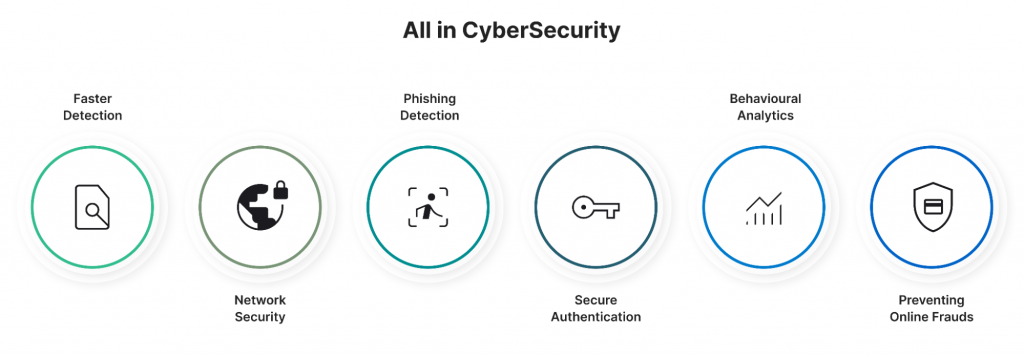
9. Space Explorations
Scientists here deal with vast quantities of data that can be processed and analyzed effectively only if AI comes into play. However, Artificial Intelligence finds its primary application in space explorations, not on Earth. While our reach remains too short of sending human expeditions to other planets, AI-powered autonomous machines have to do most of the work, serving as our eyes, ears, and hands where humans don’t dare to set foot so far.
10. Lifestyle
Employing AI on a large scale at work and carrying virtual assistants with us on smartphones, we have let it inside our premises as well. Smart homes, integrated living, and the Internet of Things are only starting their advance into everyday housekeeping. Yet, people are ready to delegate to AI numerous household chores, including shopping, cooking, washing, etc. The sophistication and extensive application of image recognition algorithms will make it possible soon.
Summary
The world of the early 21st century undergoes rapid changes, quickly transforming into a highly digitalized one. Artificial Intelligence is increasingly penetrating an ever-growing number of industries, making them more human-friendly and turning our planet into a comfortable place to live in.
The list we offered is in no way exhaustive, with AI finding new realms ever to conquer. The experts of IDAP can accompany you on this exciting journey and create top-notch custom software that will streamline your business activities and boost revenues.




